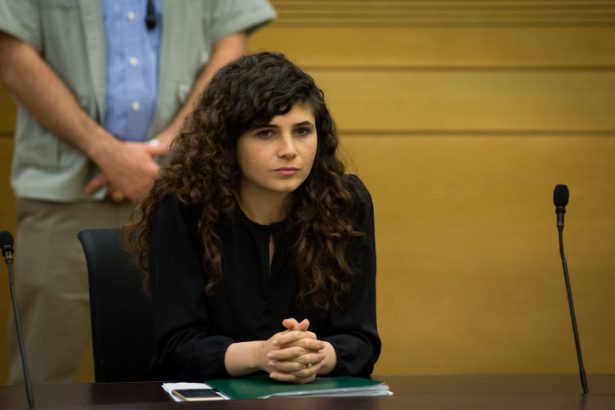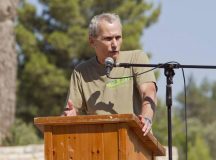From combat soldier to veterinary nurse to the youngest MK in the Knesset, Sharren Haskel has had an unconventional route into politics. In early October Haskel sat down with deputy editor Samuel Nurding to discuss how she believes she can change Israel for the better, as well as her vision for the future of the West Bank and Gaza and her long-term goals in what she calls the ‘Israeli political zoo’. Download a PDF version here.
Samuel Nurding: How and why did you get into politics?
Sharren Haskel: I never thought I would end up in politics. After my military service – I served as a combat fighter in the Border Patrol based in Jerusalem during the Second Intifada, and subsequently did an officers’ course – I decided to move overseas. I lived in the US before moving to Australia for six years, where I studied veterinary nursing, worked in an animal hospital and volunteered in a NGO that rescued injured wildlife. I decided to move back to Israel and volunteered at Minister Michael Eitan’s [a former Likud MK] office and became more involved in local politics through different right-wing youth groups as large scale economic protests were happening around the country. While there were many slogans, I recall there were very few in-depth conversations about what the real problems were or how to resolve them.
I joined the New Liberal Movement (liberal in the classical sense) and became more active in advancing economic issues such as promoting the free market, reducing taxes, bureaucracy and red tape, which I believe are suffocating our generation in Israel. The volunteering position with Minister Eitan opened up the political world for me. I studied the field, began to learn how it works and finished a Masters in International Relations. After two years I was asked by the Likud to compete for a seat in my local municipality. In 2015 when Prime Minister Benjamin Netanyahu decided to go to elections I ran for a seat in the Knesset. I had planned to own a farm but I ended up in the Israeli political zoo.
SN: What experience most shaped your political orientation?
SH: Socio-economically I was very influenced by my family and childhood. When I was 12 I began working for a pizza company – I would go to high-school in the day and work in the evenings. And my father, who had to drop out of school and start work from a very young age to provide for his family, instilled in me a belief that the more productive you are as a human being the more rewarded you’ll be.
Having family from all around the world (my mother is Moroccan French) has also given me a perspective on how Israel is viewed from the outside. My first racist encounter was when I was seven years old when a French kid in McDonalds spat and called me a dirty Jew. My grandparents came from a rough Parisian neighbourhood and I had my first kafuffle there; these experiences gave me an insight into how important the country is for a shelter for our people.
My military experience shaped me dramatically. I entered the Israel Defence Forces (IDF) with a ‘leftist’ perspective. But the reality – suicide bombers on buses or in bars, friends killed, and the feeling that rather than the peace the Palestinians promised us we were getting terror – sobered up my perspective. Even before my IDF service, as a school student, I once woke up late and during breakfast heard a loud explosion. I turned on the TV and saw the bus I was meant to have taken had been bombed. When this is the reality one grows up it really affects you and it gives you a completely different perspective of life.
SN: You have been ranked (for the fourth consecutive year) by the extra-parliamentary group Israel Freedom Movement as the Knesset member most dedicated to advancing the values of individual liberty and the free market. What is Israel’s scorecard on these issues, what else is there to be done and how can it be achieved?
SH: The biggest challenge is cleaning up the government so most of my legislative bills are about promoting legislation to eliminate antiquated laws, which can only be done by passing new ones. I don’t believe our generation wants the government’s intervention in the private sector and it shouldn’t be trying to run private businesses – it doesn’t know how and when it tries it creates problems. There are brilliant people in Israel developing amazing things in start-ups, technology, research, agriculture, water and medical technology. But the one thing that continues to stop them is the government’s involvement, which adds a lot of bureaucracy on every start up and business and places huge amount of taxes on innovative enterprises. This leads people to feel like they will be more successful outside of Israel. For example, take the medical cannabis industry. We were pioneers in researching how to help people have who have incurable diseases to live a normal life. The government even started exporting our technology to other countries. People from Australia, the Czech Republic, Canada and Austria came to Israel to learn about it. But then the government forbid the exportation of medical cannabis and the industry went into a shock. People starting investing into other countries. One of the biggest suppliers of medical cannabis to companies in Israel is now moving abroad.
From an economic perspective, two of the biggest challenges facing us is how can we bring more businesses into Israel and how can we keep our brilliant minds here. We should reduce taxes, reduce regulation and reduce bureaucracy.
SN: Female employment levels in Israel are above average for the OECD. The current Governor of the Bank of Israel, the current Chief Justice are both women, and there are more women in politics than ever before. At the same time there is still discrimination suffered by women – in workplace salaries and other areas and there is tension within the IDF between the rise in women in senior roles on the one hand but increased allegations of discrimination due to demands by religious soldiers on the other. How do you view this issue, what are your concerns, and what can be done to improve the situation?
SH: Everywhere around the world women are experiencing challenges, especially in fields of security and technology that is dominated by men. Yesterday I met my cousin in London who has a high-ranking job in the British fire department and we discussed similar challenges women in the UK and Israel face in the workplace. But I am very proud of Israel in this regard. There are more and more women serving in male-dominated industries. Yes, the challenge is greater in the army, but it was here that I really learnt how to ‘push my elbows’ and fight for my place. In politics it’s much less aggressive. Women all around the world are demanding equal rights and in Israel we have many women parliament members and many women in high-powered positions. When I speak about feminism I say my military experience was one of the most empowering things I did. It gave me tools to learn about my physical and mental abilities and pushed me to do as well, and sometimes better, than my male colleagues.
SN: There have been a number of recent controversies about what critics see as a rise in ‘anti-democratic legislation’ such as the NGO bill, bills to reduce the power of the Supreme Court, and the nation state bill. Newspapers like the New York Times question whether democracy in Israel is in danger. How do you respond to such concerns?
SH: It’s very hypocritical for countries and world leaders to make these arguments when they themselves are doing the exact same thing. There is always a double standard for Israel; we are held to a much higher standard from the rest of the world. In 1947 we won a vote by the majority of nations to declare a state for the Jewish people, and the Nation-State Law reflects how we chose to define our state today. Judaism is not just another religion but also an ethnicity. Most of the population are secular, but they consider themselves Jewish because being Judaism has cultural, historical and ethnic aspects and the Nation-State Law only defines our cultural rights. There was criticism of the law because it clarifies that the flag will include a Star of David. Yet the UK flag, Norway, Switzerland, Sweden and others all have the Cross – does that mean that Jews or Muslims in the UK are not equal as Christians?
Israel is the only true democracy in the Middle East, where minorities are being treated equally. We live in a region where Christians are a persecuted minority, but in Israel they are thriving, and play a vital part in every aspect of our society. In hospitals, educational centres or the law courts you will see Arab Muslims and Christians working alongside Jewish citizens. In our High Court there are 12-14 judges, of which two are from an Arab minority. That might sound normal to a Western country, but most countries in the Middle East don’t have that percentage. Could you imagine a Jewish High Court judge in Syria or Lebanon? It will never happen, at least not in my lifetime.
SN: What is your vision for the Palestinian question?
SH: Everything has been stuck since the Clinton Parameters in late 2000. Although US President Donald Trump has been heavily criticised, I believe he has brought new movement towards resolving the conflict. I don’t believe his peace plan will succeed partly because the Palestinians are refusing to work with it. Therefore, we will likely return to the status quo. But I believe eventually Israelis will conclude that there is only one solution: there is a Palestinian state, and that state is Gaza. The Gazans have autonomy, can dictate their future, and can define themselves as a people and a culture. Unfortunately, rather than choosing to turn their state into the ‘Singapore of the Middle East’ and investing in infrastructure, education and the economy, they have spent all their money on building tunnels, rockets and preparing for war. But nonetheless, it is an autonomy and they can create their own future in what I believe should be declared the Palestinian state.
With regards to Judea and Samaria, I believe we need to apply Israeli law there but to do so creatively. Most of the Palestinian people have lost faith in their leadership and the Arab world, who for over 80 years have been promising a return to Palestine through violence.
There are two ways to solve the problem. One is to give the Palestinian people cultural autonomy in the main Arab cities, such as Hebron, Ramallah, Jenin, Nablus etc. which will be managed by the Hida’rah (the cultural leadership that they are used to) while the rest of the area will come under full Israeli law.
The other approach is two pass two pieces of legislations. One would start a 20-30 year process for Judea and Samaria to adapt to Israeli law, culture and to a completely new system which would giving the Palestinians temporary residency for 10 years, permanent residency for 10 years after then allow them to apply for citizenship. In that time, they would need to provide proof that they are adapting to the new system – and issues like having a criminal record during their temporary residency would prevent them from becoming permanent residents. The second piece of legislation would state that any person convicted of a terrorist offense, including the murder of civilians for nationalistic causes, will be deported to the Palestinian country defined as the Gaza Strip. That would allow those who want to define themselves as a nation, a people, to do so in their own country, while those who want to live peacefully and coexist, and adapt to a new way of life will be able to do so in Judea and Samaria.




































